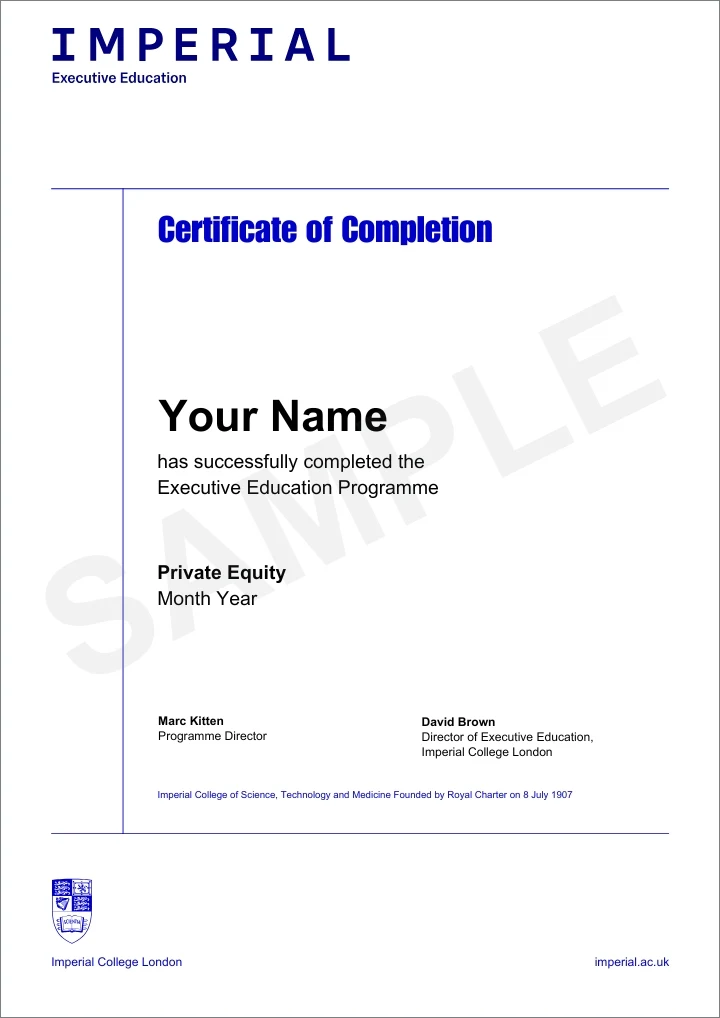Private Equity
Testimonials
Programme highlights
This programme provides a strong theoretical framework as well as practical applications and tools that will enable you to:
Describe the origins and organisation of the private equity industry
Recognise the various segments of private equity and how they create value
Illustrate the investment process and the importance of due diligence
Identify the latest developments in the private equity industry
Evaluate private equity investment opportunities
Determine private equity negotiations and deal structuring
Illustrate the managing and monitoring of an investment
Perform valuation of LBOs and calculations for performance distribution
Appreciate the roles and careers in the private equity industry
Programme experience
Video lectures
Live webinars
Interactive activities
Discussions
Case studies
Dedicated programme support team
What you will learn
This 11-week programme provides participants with a thorough understanding of the past, present, and future of private equity as well as the opportunities and risks it presents for investors and insights into recent developments in emerging markets. Unlike many finance courses this is not an overly quantitative programme. While the discussion of valuation contains quantitative work, the main focus will be on analytics—especially qualitative factors.
Who should attend
This programme allows participants working in investment banking and finance build solid foundational knowledge in the private equity industry and take advantage of it as a financial tool and an investment opportunity.
It is particularly relevant for the following roles:
Investment Banking Professionals looking to transition to a private equity role and build credibility by adding a certificate to their profile. Representative roles may include:
Investment Banker
Investment Banking Associate
Investment Banking Specialist
Investment Manager
Investment Advisor
Investment Banking Analyst
CXOs and Senior Executives looking to build a roadmap for initiatives that will generate the most value for the company, and recognise the drivers of value creation in private equity. Representative roles may include:
Chief Executive Officer
Chief Finance Officer
Chief Investment Officer
Managing Director
Managing Partner
President
Vice President
Director of Financial Services
Mid-Level Managers and Analysts working in the Investment Banking or Finance industry seeking to understand how private equity negotiations and deal structuring work. Representative roles may include:
Quantitative Analyst
Accountant
Hedge Fund Manager
Risk Manager
Asset Manager
Financial Analyst
Investment Analyst
Fund Manager
Professionals working in Private Equity firms looking to build value for their company and progress their career in the field of private equity. Representative roles may include:
Private Equity Associate
Private Equity Specialist
Private Equity Analyst
Private Equity & Venture Capital Investor
Investor
Associate
Senior Associate
Partner
Consultants or Financial Advisers aiming to create value for client companies, excel at deal management, build long-term relationships, and better understand how to evaluate PE investment opportunities. Representative roles may include:
Investment Consultant
Finance Consultant
Financial Adviser
Family Office Representatives
Private Banker
Private Investor
Investor Relations Specialist
Programme faculty

Partner at Candesic Strategy Consultants, Visiting Professor in Finance at Imperial College London
Marc Kitten is a founding partner at Candesic Strategy Consultants in London. He has 25 years of experience in transactions and financial markets and advises corporations and ...
Case studies
The programme incorporates real-world case studies into the lessons to illustrate both best practices and missteps in action, including:

Berkshire Partners: Bidding for Carter’s
Review the private equity firm’s considerations and overall strategy in recommending a final bid and financial structure for a leveraged buyout of the children’s apparel company, from their initial research and due diligence to valuation and bid strategy.

China Fire
Explore different methodologies for valuing a company through the lens of this case, where a Chinese company in the fire protection industry is being taken private by its family owners and Bain Capital’s private equity arm.

Yell Group
See how a team of private equity investors work to value the leveraged buyout of a Yellow Pages business that operated in both the United States and the United Kingdom as they deal with cross-border valuation issues as well as how to value a stable cash cow business and a growth business.

Emi
Study how international law firm Clifford Chance advised Citigroup on the disposals of EMI's recorded music business and music publishing business for a combined $4.1bn value.

Kmart, Sears, and Esl
How did a hedge fund become one of the world’s largest retailers? Explore the emergence of financial buyers like private equity funds and hedge funds as strong competitors to strategic buyers in the same industry in the mergers and acquisitions market.

Southern Cross
Follow the formation and development of a private equity firm investing in Latin America in this case study.

Certificate
Upon completion of the programme, participants will be awarded a verified digital certificate of participation by Imperial Executive Education.
Please note that this programme contributes to earning Associate Alumni status. Visit the Associate Alumni page to find out more.
Imperial College Business School Global MBA
Successful completion of the Private Equity programme may be used for credit on the Imperial College Business School Global Online MBA, subject to acceptance onto the Global Online MBA programme. Completion of this programme does not guarantee entry to the Global Online MBA programme.
FAQs
Didn't find what you were looking for? Write to us at learner.success@emeritus.org or Schedule a call with one of our Programme Advisers or call us at +44 208 629 1765 (UK) / +1 315 509 2976 (US) / +65 3138 2451 (SG)
Early registrations are encouraged.
Flexible payment options available.
Starts On
